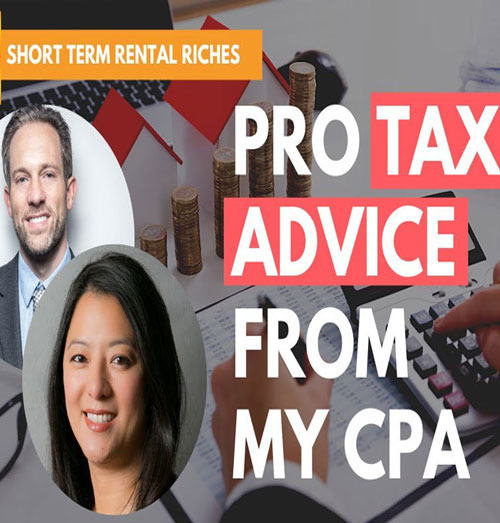How to build an Airbnb Business: Why we should “partner with the government” with special guest Tom Wheelwright (Part 1)
We have an extra special guest this week that you will not want to miss! He is one of the leading authorities on taxes in the nation when it comes to building your wealth tax free.
You may recognize the name, Tom Wheelwright, from his bestselling book Tax-Free Wealth: How to Build Massive Wealth By Permanently Reducing Your Taxes or because he is the CPA for Robert Kiyosaki! (author of Rich Dad Poor Dad).
Tom is an excellent teacher; his goal is to help people achieve their financial dreams faster by permanently and legally reducing their taxes. He has been a contributor to Entrepreneur magazine, and his work has been seen in Forbes, The Wall Street Journal, The Washington Post and on FOX, NPR, ABC News Radio and hundreds of other media outlets.
This week we will break down some insights from Tom’s latest book (I just had the pleasure of reading) The Win-Win Wealth Strategy: 7 Investments the Government Will Pay You to Make.
Don’t miss this extra special week as we discuss:
- Why you should be an active partner with the government
- Why the rich don’t pay taxes
- What you should do if your CPA is skeptical about saving taxes
- Strategies for saving tax
- Why the government will discount your investment activities (if you pick the right ones)
If you want to hear more from Tom (make sure to catch part two) but you can also find Tom at www.Wealthability.com or on one of his two popular podcasts: The WealthAbility® Show with Tom Wheelwright CPA and The WealthAbility® for CPAs Show.
Are you enjoying the podcast? Please subscribe, leave a rating and a review, and share it! This helps us reach others that may find the info helpful as well.
Get a copy of my 12 proven house rules to protect your property from almost every negative situation (highly recommended)
You can find all of our links here including our recommended resources, short-term rental playbook, Instagram, and more!
Click Here to view TranscriptIntro: Welcome to short-term rental riches will discuss investing in real estate but with specific focus on short-term rentals quick actionable items to acquire manage and scale your portfolio. I’m your host Tim Hubbard.
Tim: Welcome everyone to the short-term rental riches podcast. I’m super excited to have Tom Wheelwright on with us today. Tom is a CPA and CEO of wealth ability. He’s the bestselling author of tax-free wealth how to build massive wealth by permanently reducing your taxes. Tom is a CPA for Robert Kiyosaki and a lot of you might know of Robert Kiyosaki from his book, Rich Dad, Poor Dad. She’s been very Influential for a lot of people, the real estate World. Tom has spoken on stage on every continent and to over 100,000 entrepreneurs’ business owners’ investors. His goal is to help people achieve their financial dreams Faster by permanently and legally reducing their taxes. He’s a contributor on Entrepreneur magazine. His work has been in seen in Forbes Wall, Street Journal, Washington, Post a bunch of bunches of places. I’m really excited to have you on Tom. Thanks for joining us today.
Tom: Thank you, happy to be with you guys.
Tim: Yeah, taxes are, they’re very complicated subject but they’re very very important and there’s a lot of planning that goes into it and they’re constantly changing and there’s a lot of exciting potential opportunities with taxes related to short-term rentals. So, I’m excited to get into that today. But before we do, I got to say your first book I used to listen to years ago, I was going to college and listening to audiobooks and I discovered Robert Kiyosaki and then discovered your work and it’s really been a really big help for me, but you have a new book out called the win-win Well strategy, 7 Investments. The government will pay you to make that you just recently released. So, I’m excited to have gotten my copy and was wondering, if we could just start off. If you could explain this idea of us partnering with the government. And I did that in air quotes. For those of you that are not watching the video and just listen in the podcast.
Tom: Sure. Look, anybody who’s ever and the paycheck realize it’s pretty quick that you don’t get a hundred percent of your paycheck, right. Some of that paycheck is going to the government. You don’t get to choose whether some of that paycheck goes to the government because there’s FICA and FUTA and there’s all these taxes. So, effectively everybody is a partner with the government. You don’t get to choose whether you’re a partner with the government. What you do get to choose though is what type of partner you are with the government. Most people Tim are what I’d call silent partners. You know, the go on their merry way, they pay 40% in tax or even more than that. In many cases doctors’ lawyers highly paid professionals’ athletes. They can pay up to 60 to 70%. I think is Phil Mickelson who estimated his tax bill was around 70%. And you know why would you I mean seriously would you rather earn a million dollars and pay seventy percent tax for 400,000 dollars in Pay zero? Well pretty simple 400,000 zero is way Matter a hundred thousand dollars better than a million dollars and seventy percent tax.
So, the question is if you look at the tax time, you read my first book, the tax-free wealth, which is been number one for almost 10 years and its category. Basically, what I explained in that book is that the tax laws a series of incentives, right? It’s just government incentives. It’s basically a roadmap to reducing taxes, government has sent us to do things. Cameron wants done so in what I was looking at for women. Well, strategy is okay but why, why does Vermin do that. Why would they be interested in partners? That are not just silent Partners if they can collect 40 to 60 percent?
Why would they just not collect 42 6% from everybody? And in fact, we know that, I mean, it’s pretty popular right now. Rich don’t pay tax, right? And Donald Trump 10 years out of15 years, no tax liability in his stolen tax returns. That’s a whole nother topic, right? Somebody should be going to prison for that one. And not Donald Trump, frankly for that. Theft but somehow somebody got ahold of his tax returns and it proved that he and pay tax in 10 out of 15 years. And two of the years that he did pay taxes paid 750 dollars in tax. I’m sure that those make sense to be accurate numbers for them. Because if you look at what the government wants done, the government fundamentally besides defense and transportation, the government needs seven basic things to happen and doesn’t matter which government. So, when Walt strategy we looked at 15 different countries and the tax incentives are remarkably similar from country to Country in 15, different countries developed countries.
Tim: I really like how you broke it down explaining some of the other countries to that’s a good thing. You didn’t,
Tom: We have 60 pages of endnotes charts and tables and so forth. It was a massive undertaking to do but I wanted to show that look this is not a U.S. phenomenon. This is a worldwide phenomenon and so the people understand that look, the government gets something out of this too. So okay, let’s say you don’t want to be a silent partner, you go. Okay. Well, what does it mean to be an active partner with the government? Well, it means doing those things government wants done. Well, what is it going on done? Pretty obvious first thing that they want done is jobs. Number one thing they want jobs created. If the government creates a job, it cost them at least a dollar for every dollar of benefit they get. But if they can just give a small tax incentive for jobs, then they can basically leverage government funds. So, they don’t have to create jobs. They can encourage people, like you and me and your listeners to create jobs and those jobs. That’s why business is always in every country. The number one, tax incentive is for business owners.
I mean if you looked at the last few years during the pandemic do you are a business owner and you work from your home office. You got to deduct your home office. If you were an employee and you work from your home office you did not okay. That should be a clue. Right? Why are the business owners getting induction? But the employees are not. Well, it’s because employees are fundamentally. All they can produce is one unit of production. There one employee, they produce one unit of production but a business owner, I mean you take a business. Amazon, they’re producing hundreds of thousands of units of production from a single business because they created all these jobs, right? So that’s why an Amazon gets tax incentives, that an employee doesn’t, because Amazon creates jobs and employees don’t. Okay, so that would be number one.
Number two, is technology, so that relates to jobs, right? These big businesses, businesses create technology all over the world and in fact, we’re Probably the least of the country’s incentivizes technology. The US incentivizes technically not nearly as much as places. Like Singapore, South Africa, France, a lot of other countries, much better incentives, tax incentives for technology, but that is something that you want. An electric car. You’re not going to get that from the government. I’m sorry. Okay. And despite what certain people have said in the administration, the vaccines for covid, did not come from the government. They came from private technology. They came from private companies who had been working on that technology for 40 years, okay, MRNA technology is not technology. It was discovered three years ago, it was discovered 40 years ago and they’ve been working on. It testing it’s that are for 40 years and they receive tax benefits for doing that. Okay, as an incentive because otherwise they could never afford to do it.
So, then you go, okay, but what else do we have? Well, government wants housing. They want to housing. I’m so they incentivize housing one. Nobody. I’ve never met. Anybody Tim who want his goal in life was to live in government housing? That’s not people’s goal. They may say they want the government to contribute to their housing, but then I want to live in government housing. It’s not good stuff. We’ve seen it, we’ve seen the project. They’re not good place to be. You don’t want to go there during the day time. Let alone at night, they’re not safe. They smell bad. They’re not well managed, nothing is good about government housing then you have. Okay, what else does the government? Well, they need to create energy so there are energy incentives, both renewable energy, and Fossil fuel energy. They want to create food. They need food to be produced. So, there are agricultural incentives. Those five are all business related. Those are all investor related. Those require very high activity. There’s two others, though. It’s funny. People always complain about the five that they don’t do and they never complained about the to that they do. And yet, those two are not nearly as valuable to the government is 25 that they don’t do, and those are insurance, which the government does want you to be protected and retirement, government actually makes no money by encouraging retirement. They simply get.
Hopefully, have some retirement savings so they don’t have to come and bail them out. But those, if you think about it, life insurance, retirement savings is very much about you. It’s very selfish. That’s very much about your money. What do you get? What you find is that and what we discovered when Walt strategy is that the more generous you are the less tax you pay, so the more housing you built for other people. The better the tax benefit. We get a deduction for mortgage interest on our own house, right? But it’s limited we deduction for taxes, but they’re limited. If you go by a housing, the do housing for other people. Even whether its long-term rental or short-term rental those deductions are unlimited virtually unlimited.
Tim: We cover a lot of topics on this podcast and a quick action will bite size format. So, you have the tools Acquired improve your short-term rentals on your own. But if you want to go deeper, I’ve a special invite for you. Join us once a month that are rested, investor Clubhouse. For we go in-depth on an individual topic, everything from analyzing properties to improving operations and our bottom line, we cover it all at Club House members and myself are sharing best practices to earn the most revenue with the least amount of headache and I would love to have you there as well. That’s rest methods.com forward slash Rich.
Our lives are shaped by those we spend the most time with. So, if you want to take your Str to the next level, come join us. I hope to see you on the inside.
Tom: So, you know what, all the government saying is do things for other people, do things for society, as a whole, the government wins. Because guess what? The government’s going to collect, they’re going to get a portion of that Revenue down the road, is you succeed and you start making money in your business. And so they’re going to get a portion of the revenue from you employees. So, the government actually makes a lot of money on Tax incentives. Don’t ever think that the government is giving something away, they are an investor, you can have them be a silent investor, which isn’t the best kind of investor, right, is one who’s a silent investor. They’re always the best kind of investors. The active investors not so much fun but sigh Investor’s they’re great. You just follow the kind of the agreement that you have which is called the Internal Revenue code. You follow that agreement, that’s the agreement and as long as you follow that agreement, they won’t bother you if they audit you, they’re just I mean look if you had a deal with somebody else, they come on it, you why shouldn’t the government audit, you? Yeah. I don’t think there’s any problem with that is, as long as they’re following the rules, which they don’t always But, and they’re not heavy-handed. Then it’s fine being audited with, I’ve handled many audits over 40 plus year career and never found rarely found the Auditors to be difficult.
So, you know, they’re just they’re doing their job and they’re just making sure that the contract is followed and that’s all they’re doing. So, you kind of look at it, like a partnership, I don’t know, I’ve done Way, Way Beyond what you were expecting here.
Tim: No, no, no. This is good stuff.
Tom: If you go to this point where you just We’ve got to get in our heads that we’re partners with the government start there and then you go. Okay. Do I have a choice of what kind of partner to be? And yes, you do silent or active? Okay, if I’m active, what does that mean? And how do I do that? Well, that’s where we go into and when one strategy literally there are, for example, you start a business. I go through an example and when while strategy chapter 2, why show that the tax benefits for starting a business are greater than the cost of starting the business. The government literally will pay you start a business. A single hole under the energy section. I look at technology and right now we’ve got these big solar tax credits and solar tax benefits. The government will pay for two-thirds.
Tom: That and they only expect to get your tax rate back which is probably a third. So, they’re going to put into thirds but then only you can take back 1/3. That’s a really good investor. I want those kinds of investors. They put into thirds of money, only get one third of the profits, that’s a good deal, and that’s basically what happens. With the solar energy. So, there are some amazing opportunities. I’m in the Solar stuff that came in. Don’t be thinking, this is a Republican or conservative mechanism. First of all tax incentives, started in Earnest with John F, Kennedy in 1961 and the biggest tax incentives. We’ve had recently our from mr. Joe Biden, President, Joe Biden, who the incentives for the the electric vehicles, the incentives, for the solar energy, wind energy, Hydroelectric, energy, even nuclear energy. Those are all Biden. Okay. This isn’t the last few months. So, you know, I want people to get out of this idea that the Richer trying to cheat not they tax. The rich don’t have to cheat the tax laws, set up, frankly for rich people to get richer. That’s why I wrote that book with Robert Kiyosaki called, why the rich get richer, okay?
Well, everything’s set up that way, but just also realize that under the Constitution of the United States, we have an equal protection clause which means You can’t do something for one person to another person can also get. So just because you’re not big, doesn’t mean you get the same benefits which would take us to short-term rentals.
Tim: Mmm. Well, I’m really excited to get in the short-term rentals and just real estate a little more in general. But first, I gotta say, I love the way that you explain everything Tom because it makes it just so much easier to understand something that’s so complicated. And I realized a long time ago, luckily, that if I have a thousand dollars, A potential write-offs, for example, and I just neglect to write those off or I wasn’t aware of some legal way that I could write those off. And my tax rate happen to be 40%, that’s kind of just like me giving away four hundred dollars, right. Then I’m not going to get back. So, I like to think of it like that. Sometimes,
Tom: Let me give you another thought. How big of a sale is big enough for you to go by? They want to go shopping at a store. How big is sale? Do you need?
Tim: I guess it depends on what I’m buying, right percent
Tom: 20%, 30% 30%, gets you interested, what if you have to what if you can get a 40% government discount on everything you bought?
All right, so, I’m standing here in my studio and the government paid for 40% of the studio. Okay. Well, it’s a pretty nice Studios, pretty expensive, but guess what the lot less expensive when the government’s paying for 40 percent of it,
Tim: totally
Tom: Beyond what the government is happy? Because governments making a ton of money off to me, they put in an investment up front and they’re getting a huge return on their investment. So, one way or the other, so you know, it’s good for the government, good for us, everybody wins.
Tim: Yeah. Another another great way to look at it. We’re going to get into real estate. But before we do, I know for a lot of people out there that depending on who your advisor is, or your CPA, a lot of times we get pushed back, right when we say, oh, I want to do this. What would you say for those people out there that are getting that sort of advice, but there may be discouraged from taking advantage of legal tax Loops, I guess you can call
Tom: The roll number one is you don’t want an advisor, who’s afraid of the IRS, that would be rule. Number one, I mean, seriously. I’ve worked with a really, a lot of really nice IRS agents. Not one of them was top of their class people. Okay, it’s not a criticism. It’s just that if you go to school, I mean like I went to University of Utah’s and my undergraduate degree and then went to University of Texas. I’m not going to graduate from the University of Texas and go to work for the IRS and graduate from the University of Texas and went and worked for some young. Okay, that’s what you do, the salaries twice as much the learnings twice as much and you’re not part of a government Union, which I think would be a fate worse than death myself. But so my point is is that you want to make sure that you want to have LeBron James on your team, you don’t want to have some kid grade schooler on your basketball team. You want to have LeBron James on you. So the reality is that the better your CPA, A the less likely you’re going to be audited B, the last likely than not it’s going to cost you a significant amount of tax and C, the more likelihood you’re going to pay a lot less tax than you would if you didn’t. So, we have a network of CPA firms around the country.
We have about 500 accountants. We’re awesome firm 60, CPA firms. And you know, I get to train them and not one of them is afraid of the IRS. Not one of them is going to back down. Here’s the thing though, I find that a lot of people say well that sounds like you’re really aggressive. I’m going well, it depends on how you define the word aggressive versus the word conservative. So, to me conservative is doing something within your knowledge base.
So, for example, if you were to get into a race car, okay? If I get into a race car, I can’t go to under miles an hour and be conservative. That would be Outside of my abilities. Okay? But somebody, you know, in the Brickyard 400. Absolutely. They go 200 miles an hour all day long just in practice. Okay. And then they’ve got all these cars right next to them, I’m going, okay. So, sounds like aggressive, right? No, it’s not aggressive to them. They are simply doing something that they’re completely comfortable doing. I am not comfortable doing that. On the other hand, I look at the tax I’m going okay. I’ve spent 40 plus years. I just realized that my first CPA job was in 1979. So that was my first job in college when I was working for a CPA firm last. I checked that’s 43 years ago and I’ve just studied the tax law. So, the tax was not that difficult. It’s a lot of complexity and the details but the fundamentals are really simple. I mean, that’s what I wrote in textual. That’s what I wrote in the different part of the tax law in women wealth. Is that the Those really fundamentally, it’s just a series incentives. So, I have to do is find out what those incentives are. Well, if you have an advisor, that is doesn’t understand much of the tax law. They should not go outside of their tiny understanding of the tax law, okay? And if all you want, is somebody with a tiny understanding, the tax laws, so they can file your tax return. Great. That’s what you should be doing but if you want to reduce your taxes and you want to take advantage of all of the These thousands of incentives, then maybe you want to have somebody who actually understands a lot of the tax law.
I think our Network CPAs are the most conservative CPAs in the world because we never go outside what we know, we just know more than anything. Yeah, that’s the key, right? And it’s like okay you do short-term rentals, I mean we’ve all been bad short-term rentals. We’ve all been in good short-term rentals. I was in a short-term rental last week, an Airbnb up at Page Arizona Lake Powell. This woman knew what she was doing, Trista knew what she was doing. I mean she had designed that house. She’d renovated the house to be really almost an ideal Airbnb and it’s just a bedroom, two bath house. Nothing, spectacular is a little residential neighborhood in a teeny, tiny town, in northern Arizona. And it was delightful for my family to come up and spend the time together because she had designed it. So, she knew what she was doing. I’ve been another that they bought a house and they just put it on the market and say we’re going to rent this and they didn’t do anything spectacular and maybe had a few Pop-Tarts for you. But I mean like, we had a fireplace. We had bench swings, we have logs, we had a whole fire-starting kit that’s available to us. We had hot dogs sticks. I mean, we had a family outing one night that I would never have thought to do but because Trista had set it up that way, we did it. Well there’s a professional in the short-term rental. There are others that are not so professional so you know all professions are similar in that. They can be very complex so they can be very simple depending on how much, you know.
Tim: Yeah. Great explanation and glad you had a good stay at the Airbnb. You know, that’s what keeps it growing. So much to cover with Tom Wheelwright, we will be back next week for part 2 where we’ll dive more in-depth on short-term rentals and how it relates to taxes. Stay tuned.
Tim: Want to get on the fast track. Back to Financial Freedom through short-term rentals what all starts with the properties you acquire. But you want to make sure that you acquired the right properties, I want to give you my ebook that will show you how to do just that. There is no charge. It’s my gift to you for being one of our subscribers. Just go to rest methods.com. That’s REST Methods.com
RELATED PODCAST EPISODES
- Episode 138: The Risks and Opportunities with Short-term Rentals
- Episode 110: Get better deals by building your network
- Episode 50: The Secret to Accomplishing Anything (Special 50th Episode)
- Episode 49: Why workspace for your Airbnb is a must
- Episode 32: Why Hotels Are Envious of Short-Term Rentals (COVID Impacts)















